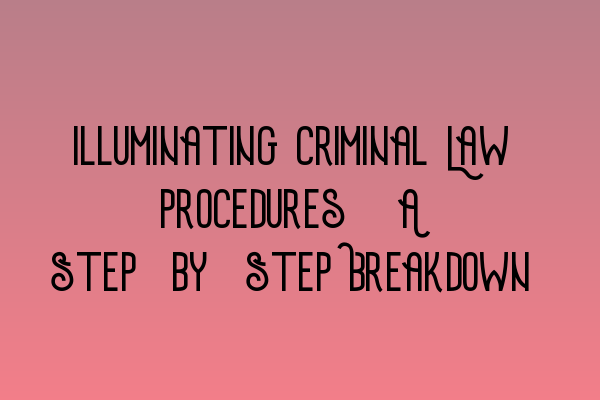Illuminating Criminal Law Procedures: A Step-by-Step Breakdown
At SQE Criminal Law & Practice UK, we understand that navigating the intricacies of criminal law procedures can be overwhelming. That’s why we’re here to provide you with a comprehensive step-by-step breakdown, shedding light on the various stages and processes involved. Whether you’re a legal professional or simply interested in understanding criminal law, this guide will equip you with the knowledge you need.
1. Investigation Phase
The investigation phase is the first crucial step in criminal law procedures. It involves gathering evidence, conducting interviews with witnesses, and analyzing the crime scene. Our SQE 1 Practice Mocks FLK1 FLK2 course is designed to help aspiring solicitors develop their investigative skills and understand the importance of strong evidence collection.
2. Arrest
Once the investigation is complete, law enforcement authorities may make an arrest based on the evidence gathered. The arrested individual is then brought into custody and informed of their rights. If you’re preparing for the SQE 1 exam, our SQE 1 Practice Exam Questions will assist you in mastering the concepts related to arrest and detention.
3. Charging
After the arrest, the prosecuting authority decides whether or not to charge the individual with a crime. The decision is based on the evidence presented and the legal requirements for each specific offense. Our SQE 1 Preparation Courses offer in-depth insights into charging decisions and the factors that influence them.
4. Bail Hearing
If the individual is charged, they may have the opportunity to seek bail. A bail hearing determines whether the accused should be released from custody pending trial. Our experienced solicitors can provide guidance on bail applications and the relevant legal principles involved.
5. Pre-trial Proceedings
During this phase, both the prosecution and defense engage in pre-trial proceedings such as case management conferences, disclosure of evidence, and witness interviews. Developing strong skills in pre-trial procedures is crucial, and our SQE 2 Preparation Courses are designed to give you a comprehensive understanding of these processes.
6. Trial
The trial is the cornerstone of criminal law procedures, where the prosecution presents its case and the defense has the opportunity to challenge the evidence. It’s essential to develop strong advocacy skills to navigate trials effectively. Our experienced advocates can provide invaluable coaching and support throughout this stage.
7. Sentencing
If the defendant is convicted, the court proceeds to the sentencing phase. Sentencing involves determining an appropriate punishment, considering various factors such as the severity of the crime and the defendant’s criminal history. Our team of legal experts can guide you through the complexities of sentencing guidelines.
8. Appeals
After a conviction, the defendant may have the right to appeal the decision. Appeals can be based on errors in law or new evidence coming to light. Our firm has a strong track record of handling appeals and can provide sound advice and representation throughout the appellate process.
As the leading provider of SQE training in the UK, SQE Criminal Law & Practice UK is committed to equipping aspiring solicitors with the knowledge and skills they need to succeed. If you have any questions about criminal law procedures or our SQE preparation courses, please don’t hesitate to contact us. Stay tuned for more informative articles, and don’t forget to check the SRA SQE Exam Dates for the upcoming exams.
